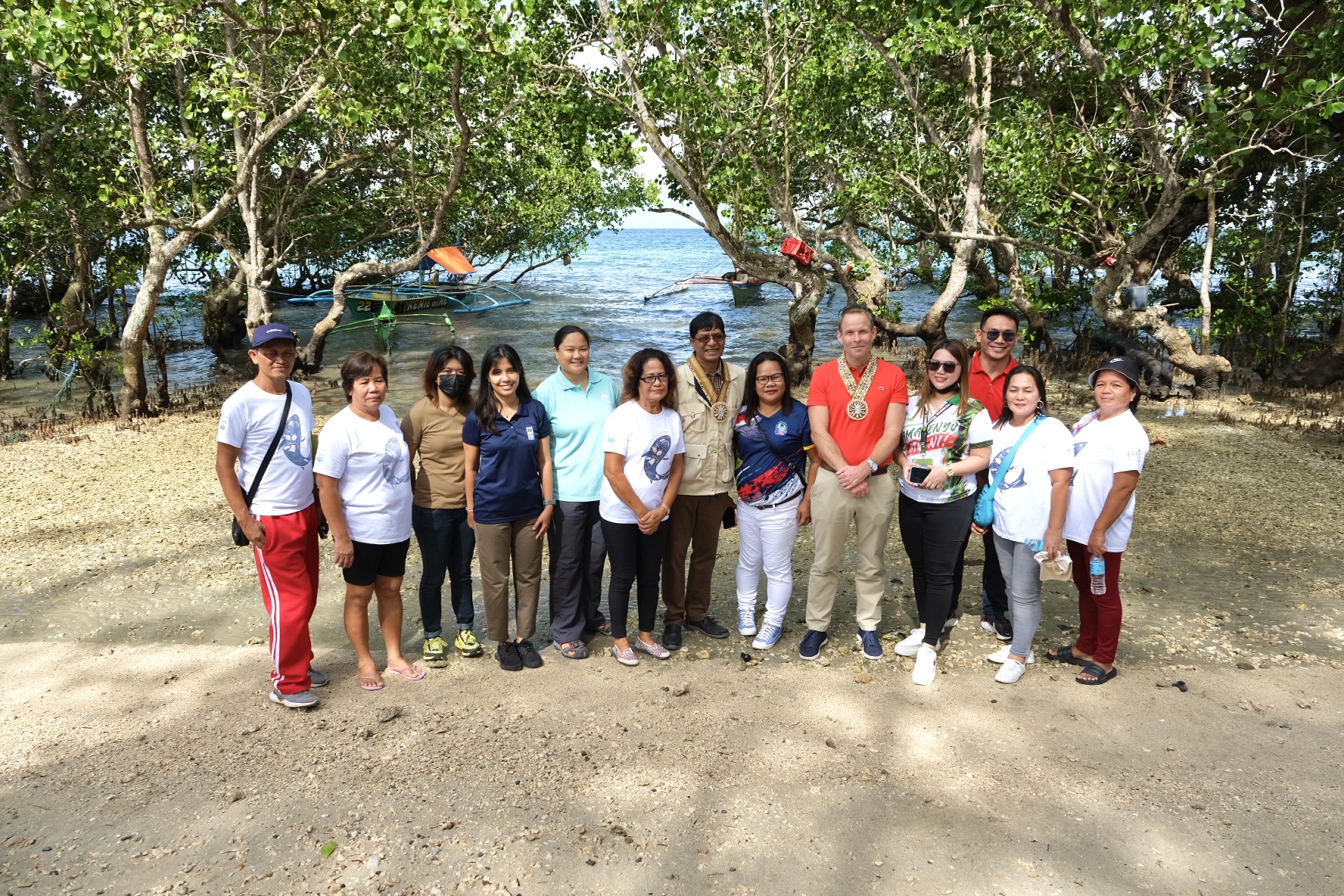Norway, UNDP showcase gains in campaign against plastic pollution
February 10, 2023

Norwegian Ambassador to the Philippines H.E. Christian Halaas Lyster and UNDP Philippines Resident Representative Dr. Selva Ramachandran with Pure Oceans and partner communities in Samal Island
SAMAL ISLAND – Young Filipino innovators are at the forefront of creating and promoting a circular economy in the island community of Samal. Through the community-based innovative solutions of the winners of the Ending Plastic Pollution Innovation Challenge (EPPIC), at least 1 tonne of plastic wastes, either awash on Samal Island's shores or generated by local communities, have been diverted from the environment with 400 kilograms upcycled since January 2022.
EPPIC is a project of the United Nations Development Programme (UNDP) with support from the Norwegian Ministry of Foreign Affairs and the Norwegian Agency for Development Cooperation (Norad).
In a field visit by Norwegian Ambassador to the Philippines H.E. Christian Halaas Lyster and UNDP Philippines Resident Representative Dr. Selva Ramachandran to Samal Island, young innovators from TrashCash and Pure Oceans showcased the results of the winning solutions that they implemented, each with USD 18,000 seed-funding support from the Norwegian Government.
Pia Roxas of Pure Oceans demonstrates how the plastic wastes collected from Samal Island’s shores are upcycled into garden bricks and tiles
Pure Oceans is prototyping a micro-circular economy model in coastal areas by collecting and recovering single-use plastics and upcycling them into industry-grade tiles and bricks. This social innovation provides a community-based enterprise operation for indigenous women in Poblacion Kaputian in Samal Island.
Kyle Salvador of TrashCash explains how their AI-based solution improves plastic waste management down to the individual level
Meanwhile, TrashCash has rolled out an artificial intelligence-based technology to improve the collection, recovery, and monitoring of plastics wastes through their cloud-based platform and incentive mechanism. Residents of Samal Island are encouraged to properly segregate their recyclable plastic wastes in exchange for household items and necessities. The waste collected is then upcycled into valuable products such as bins, crates, tables, and chairs.
In his message, Ambassador Lyster lauded the achievements of the project and underscored its role in preserving the biodiversity of Samal Island. “The EPPIC Project—supported through the Ministry of Foreign Affairs, and the Norwegian Development Cooperation Agency—provides a good opportunity for local innovations that contribute to solve the marine plastic pollution in the Asia Pacific. The Philippines, being an archipelagic nation, heavily relies on its coastal and marine resources and it is imperative to protect and conserve the marine biodiversity from threats such as the plastic crisis,” the Ambassador stated.
Dr. Ramachandran recognized the potential of the island to be a model in the effective management of plastic waste. “In a growing island community like Samal which is frequented by tourists, the approach to plastic waste management is more challenging. It is good to see that the local communities here in Samal Island are demonstrating that a micro-circular economy is feasible in an island community. Hopefully, we get to roll out these innovative solutions not just throughout the island, but beyond," he said.
From L-R: Samal Vice Mayor Toto Reyes, UNDP Philippines Resident Representative Dr. Selva Ramachandran, Samal Mayor Al David Uy, and Norwegian Ambassador to the Philippines H.E. Christian Halaas Lyster
Mayor Al David Uy of the Island Garden City of Samal is hopeful that this would be the start of a beautiful collaboration. “Samal right now is at a crossroads with the Samal-Davao bridge. We’re expecting that it would be finished in five to seven years, and that would totally change the landscape in Samal. That is why we are now preparing,” he explained.
EPPIC is an ASEAN-wide innovation challenge that aims to tackle marine plastic pollution through community-based innovative solutions. For 2023, additional support from the Norwegian Government is expected to scale up the operations in other coastal communities within and outside Samal Island, focusing on the retrieval and processing of plastics that have already leaked into the marine waters. ###

 Locations
Locations